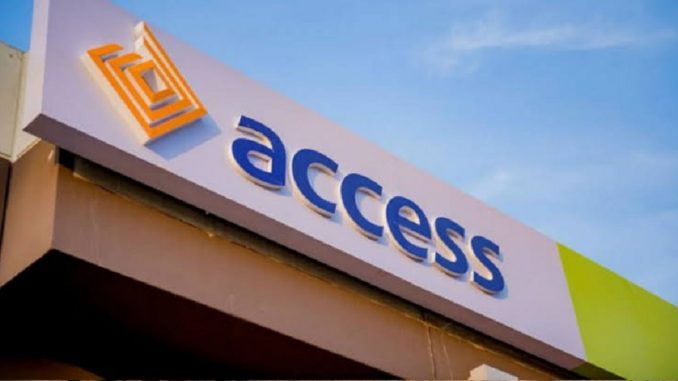
The Nigerian banking landscape is abuzz with activity, but one player is flying under the radar – Access Holdings, with its share price hovering at a concerning N27.60, the lowest among its peers. This stark disparity begs the question: what’s behind this under performance, and what does it signal for investors? Is it a buying opportunity or a warning sign? What are the possible reasons behind Access Holdings’ share price woes, and what does it mean for those looking to make informed investment decisions?
Relative to Access Bank’s share price , Guaranty Trust Holding Company (GTCO) leads the pack with a share price of N100.00, followed closely by Zenith Bank at N74.65. United Bank for Africa (UBA) and First Bank Holding (FirstHoldco) have share prices of N48.60 and N32.95, respectively.

Several factors could contribute to the disparity in share prices. While the above disparity is highly embarrassing , from the point of view of its 2024 full year results , the investors judgement that lead to the above miserable share price relative to its peers may not spring any surprise . Access Bank’s financial performance showcases its strength as a banking giant in Nigeria and Africa. With an impressive 88% year-on-year growth in gross earnings, rising from N2.594 trillion in 2023 to N4.878 trillion in 2024, the bank demonstrates its ability to generate significant revenue. This growth is driven by a 110% increase in interest income to N3.480 trillion and a 47.8% rise in non-interest income to N1.397 trillion.
The bank’s total assets grew by 55.5% to N41.498 trillion, solidifying its position as one of the largest banks in Nigeria by asset size. Customer deposits rose by 47% to N22.525 trillion, indicating a strong deposit base. Shareholders’ funds increased by 72% to N3.760 trillion, reflecting the bank’s ability to create value for its investors. With over 21 million individuals reached across Africa, Access Bank’s expansive customer base and robust financial performance position it as a leader in the Nigerian banking sector.
But investors are not a fool . What is impressive in parading the biggest assets and earnings that could not be translated to better values for the market investors ? Access Bank in 2024, came up with a profit before tax of N867.019 billion and profit after tax of N642.22 billion . In contrast, GTCO’s gross earnings of N2.148 trillion and total assets of N14.796 trillion, while substantial, trail behind Access Bank’s. Despite this, GTCO’s profit before tax of N1.266 trillion and profit after tax of N1.017 trillion showcase its strong financial management and profitability.
The disparity in financial metrics between the two banks highlights their unique strengths and strategies. Access Bank’s larger asset base and revenue generation capacity position it for continued growth and expansion. Meanwhile, GTCO’s profitability demonstrates its ability to efficiently manage its resources and deliver value to shareholders.
The market may be pricing in concerns about Access Bank’s ability to translate its expansion into higher earnings, given its already large asset base as Nigeria’s largest bank. Access Bank’s share price could indicate that the market perceives the bank differently compared to its peers.
The disparity in share prices between Access Holdings and its peers may present opportunities for investors. Access Bank’s share price could make it an attractive option for value investors looking for potential upside-down. If Access Bank can successfully execute its strategies and improve earnings, its share price may increase, providing returns for investors.

Access Holdings’ Q1 2025 results present a mixed picture, with the company achieving improved cost management and operational inefficiency while experiencing declines in return on equity and assets, as well as a significant drop in net interest margin.
The company’s return on equity (ROE) decreased from 6.25% in 2024 to 4.96% in 2025, indicating a decline in profitability relative to shareholder equity. Return on assets (ROA) slightly decreased from 4.9% in 2024 to 4.7% in 2025, showing a minor drop in asset utilization efficiency. The net interest margin (NIM) decreased from 1.52% in 2024 to 0.96% in 2025, indicating reduced profitability from interest-earning assets. Possible factors contributing to this decline include increased funding costs and decreased lending yields.
On a positive note, the cost to income ratio improved from 70.76% in 2024 to 60.05% in 2025, demonstrating a better cost management and operational efficiency. However, the ratio remains relatively high compared to industry peers, reflecting the heavy costs associated with its ambitious expansion program. The company’s expansion efforts have contributed to increased costs, affecting its cost-to-income ratio. Despite this, Access Holdings has demonstrated resilience in profitability metrics, driven by strong operational efficiency and strategic positioning.

The loan to deposit ratio decreased from 44.07% in 2024 to 42.14% in 2025, indicating a slight reduction in lending activities relative to deposits. Overall, Access Holdings’ Q1 2025 results reflect a mixed performance, with both positive and negative trends. The company’s ability to address the decline in NIM, optimize costs, improve operational efficiency, and leverage technology to drive growth and profitability will be key to its future success. Access Holdings’ ability to navigate Nigeria’s challenging economic environment and deliver value to shareholders will be crucial in determining its future performance.




